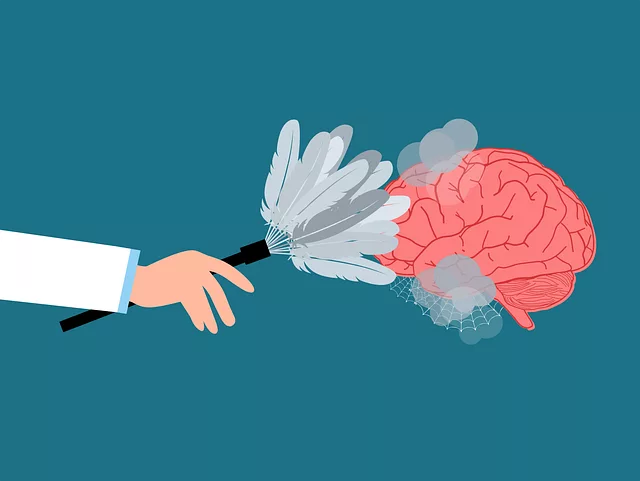Public awareness campaigns, such as those offered by Kaiser in Boulder, strategically educate communities about mental health through diverse channels like digital media, events, and educational programs. These initiatives break stigma, encourage help-seeking behaviors, promote self-care, and foster social connections, key aspects of well-being. Given Boulder's diverse population, tailored messaging is crucial for maximum impact. Kaiser, as a local healthcare provider, collaborates with organizations to ensure accurate information dissemination and promotes emotional well-being by dispelling misconceptions. Effective content strategies emphasize holistic solutions like mental wellness coaching, workshops, and podcasts, attracting residents seeking accessible services. A multi-channel approach reaches diverse demographics, increasing the chances of connecting with those struggling with mental health issues. Measuring campaign success through KPIs like workshop attendance, website traffic, or social media engagement ensures continuous improvement based on community feedback.
Public awareness campaigns play a pivotal role in educating communities about critical issues, with mental health being a pressing concern. This article explores the art of crafting impactful campaigns, focusing on strategies employed by organizations like Kaiser in Boulder. We delve into understanding campaign objectives, identifying target audiences, and designing content tailored to local needs.
Furthermore, it examines channel selection for optimal reach and emphasizes the importance of measurement and iteration for continuous improvement in mental health outreach, ensuring that services like those offered by Kaiser in Boulder gain the deserved attention.
- Understanding Public Awareness Campaigns: Definition and Objectives
- Identifying Target Audiences for Mental Health Initiatives in Boulder
- Designing Effective Content Strategies for Kaiser's Services Promotion
- Choosing the Right Communication Channels for Maximum Impact
- Measuring Success and Iterating for Improved Mental Health Outreach
Understanding Public Awareness Campaigns: Definition and Objectives

Public awareness campaigns are strategic initiatives designed to educate and engage the public on specific issues or causes. These campaigns aim to raise understanding, foster empathy, and encourage positive behavior change within a community. In the context of mental health services, such as those offered by Kaiser in Boulder, these campaigns play a vital role in breaking down stigma and promoting open conversations. By utilizing various communication channels, including digital media, social events, and educational programs, awareness campaigns can reach a wide audience, providing valuable information and resources.
The primary objectives of public awareness initiatives are to inform the public about mental health issues, dispel myths, and encourage individuals to seek help when needed. They also focus on promoting self-care practices and building strong social connections, which are essential for overall well-being. Incorporating strategies like Social Skills Training and Empathy Building can further enhance these campaigns’ impact, fostering a supportive community that understands and values mental health.
Identifying Target Audiences for Mental Health Initiatives in Boulder

In Boulder, understanding the specific needs and characteristics of various demographics is crucial when designing public awareness campaigns for mental health initiatives. Identifying target audiences allows for tailored messaging and more effective engagement. The city’s diverse population includes young adults, families, and older residents, each potentially facing unique mental health challenges. For instance, students might require education on stress management and emotional regulation while also being receptive to discussions around mental illness stigma reduction efforts. In contrast, working professionals could benefit from workshops on work-life balance and trauma support services.
Kaiser’s role in Boulder is significant; as a healthcare provider, they offer various mental health services that can be a central resource for the community. By collaborating with local organizations and leveraging their expertise, public awareness campaigns can ensure that accurate information reaches those who need it most. This collaborative approach, coupled with an understanding of target audiences, will help to dispel misconceptions about mental illness and promote emotional well-being throughout the city.
Designing Effective Content Strategies for Kaiser's Services Promotion

When designing content strategies to promote Kaiser’s services, especially those focused on mental health in Boulder, it’s crucial to understand the target audience’s needs and preferences. Research shows that residents in Boulder value accessible, holistic well-being solutions, including mental health services. Therefore, content should emphasize Kaiser’s comprehensive approach, highlighting how their offerings cater to various aspects of mental wellness. For instance, showcasing the availability of mental health coaching programs, resilience-building workshops, and even a unique Mental Wellness Podcast Series can attract and engage potential clients.
Incorporating these elements into marketing campaigns will help create an appealing narrative. The text should convey that Kaiser goes beyond traditional healthcare by offering tailored programs like mental wellness coaching and podcasts to support the community’s mental health journey. By doing so, they cater to modern consumers’ desires for personalized, innovative solutions, ensuring their services stand out in a competitive market while effectively reaching audiences searching for “Does Kaiser offer mental health services Boulder?”
Choosing the Right Communication Channels for Maximum Impact

In crafting public awareness campaigns, particularly around sensitive topics like mental health, it’s crucial to select communication channels that resonate with your target audience. For issues such as Depression Prevention and Burnout Prevention Strategies for Healthcare Providers in Boulder, where access to mental health services offered by Kaiser is readily available, leveraging both traditional and digital platforms can maximize reach and impact. Social media, given its widespread adoption, especially among younger demographics, offers a direct line to folks who might be struggling but haven’t yet sought help.
At the same time, community-focused events and partnerships with local healthcare providers can effectively amplify messages around Inner Strength Development, fostering open dialogues about mental wellness in Boulder. This multi-pronged approach ensures that campaigns address diverse audiences and preferences, ultimately increasing the likelihood of connecting with those who need these services most.
Measuring Success and Iterating for Improved Mental Health Outreach

Measuring success is a crucial aspect of public awareness campaigns for mental health outreach, especially when organizations like Kaiser offer extensive services in Boulder and beyond. By setting clear goals and defining key performance indicators (KPIs), campaign organizers can gauge their impact on raising awareness and encouraging help-seeking behaviors. Metrics may include tracking the number of participants in workshops or webinars, website traffic related to mental health resources, or the increase in social media engagement around relevant topics. For example, a campaign focused on promoting positive thinking and resilience building might measure success by observing a rise in online interactions and shares of resilient mindset techniques.
Iterating based on these measurements is essential for continuous improvement. If a particular approach or messaging doesn’t resonate with the target audience, it’s important to adapt and refine strategies. Public awareness campaigns can benefit from regular feedback loops, allowing them to stay relevant and effective in addressing mental health concerns. This iterative process ensures that resources are allocated efficiently and that the campaign’s message aligns with the community’s evolving needs, ultimately enhancing the reach and impact of mental health outreach initiatives, including those offered by Kaiser in Boulder.
Public awareness campaigns play a pivotal role in addressing critical issues like mental health, as demonstrated by successful initiatives in Boulder. By understanding target audiences, crafting compelling content, and leveraging suitable communication channels, organizations like Kaiser can effectively promote their mental health services. Regular measurement and iteration ensure these campaigns remain impactful and tailored to the community’s evolving needs, ultimately fostering a healthier and more supported environment for all residents of Boulder. Moreover, recognizing that Kaiser offers mental health services in Boulder is a crucial step towards connecting individuals with the support they need.






